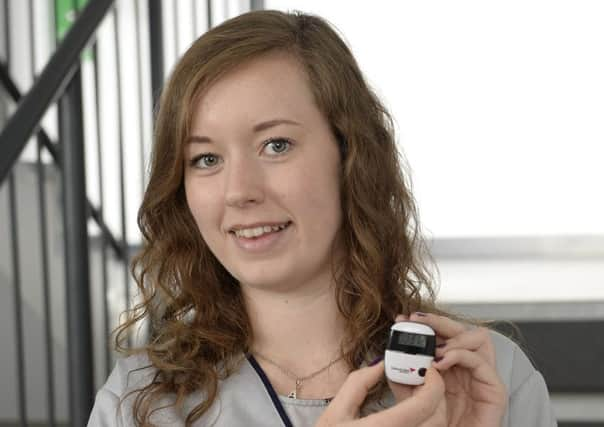Student nurses given pedometers to help boost their health
This article contains affiliate links. We may earn a small commission on items purchased through this article, but that does not affect our editorial judgement.


The University has gifted the devices to new recruits in response to research which found nearly 70 per cent of nurses in Scotland were overweight or obese.
The study in January, which emerged from the University’s Nurses’ Lives Research Programme, led to calls for nurse educators to create healthy campuses.
Advertisement
Hide AdAdvertisement
Hide AdNow the research team has joined forces with colleagues in the School of Computing in a scheme to use wearable technology to promote healthier lifestyle choices.
Each of the 650 student nurses and midwives who have just enrolled at the University were given a 5 x 4cm Edinburgh Napier-branded pedometer, which fits neatly on to a belt or into a pocket.
As well as fostering a sense of belonging among the new intake, it is hoped the devices will inspire new recruits to use the gym facilities at the Sighthill campus or to find another way to take the recommended 10,000 steps a day. Pedometers may also be given to students who study health promotion as part of a second year course.
Ailsa Sharp, adult health lead for the nursing programme in the University’s School of Health & Social Care, said: “I was shocked and surprised by the findings published earlier this year by my Nurses’ Lives colleagues about the prevalence of overweight and obese nurses in Scotland.
Advertisement
Hide AdAdvertisement
Hide Ad“We decided to try out the pedometers as an incentive, particularly for those who take limited exercise, to try to improve their fitness levels.
“As an educator, I am acutely aware that nurses aren’t able to care for others if they don’t first look after themselves. That’s why we put students’ own health at the heart of our new nursing curriculum.”
Casper van Splunter, a Masters student on an internship from VU University in Amsterdam, worked with Nurses’ Lives and Computing staff on research into how using wearable technology to monitor health affected behaviour.
He said: “When I spoke with student nurses during my internship in Edinburgh I found that even if students have a little insight into their health, such as body fat percentage or dehydration levels, it made them think about the issues involved. So even though it seems very simple, a pedometer might help nurses to think about and try to improve their own health.”
Advertisement
Hide AdAdvertisement
Hide AdEdinburgh Napier’s School of Health & Social Care is one of the largest providers of nursing and midwifery education in Scotland and, through its innovative Nurses’ Lives Research Programme, is leading research into the health of the nursing workforce.
Researchers are working with colleagues at the University of West Florida in the USA to test the feasibility and acceptability of wearable technology to improve the health and education of nursing students.
DOWNLOAD THE SCOTSMAN APP ON ITUNES OR GOOGLE PLAY
